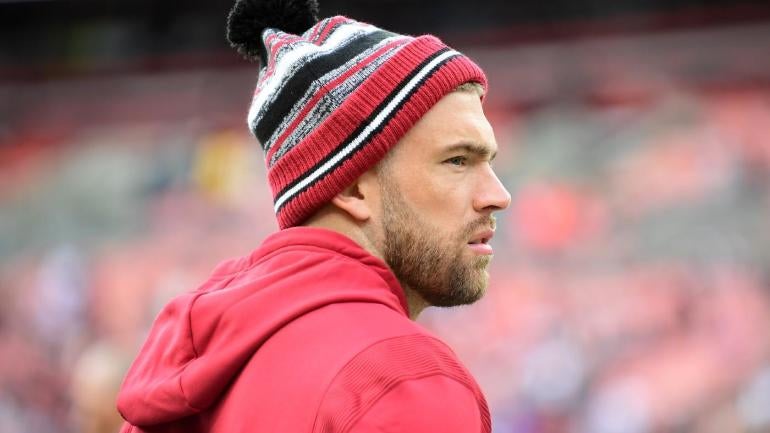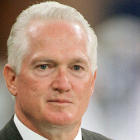
The rich have gotten richer. The Cardinals, the NFL's only undefeated team, acquired Zach Ertz in a trade with the Eagles last Friday, ending the tight end's almost 8.5 year tenure in Philadelphia. Ertz was dealt for a 2022 fifth-round pick and cornerback Tay Gowan, a 2021 sixth-round pick.
The Cardinals, who are in win-now mode, fill a void created by tight end Maxx Williams' season ending knee injury in their Week 5 win over the 49ers with the addition of the three-time Pro Bowler. Ertz, who set the NFL single season reception record for a tight end in 2018 with 116 catches, was more of a luxury than a necessity in Philadelphia. That's because of Dallas Goedert, and new head coach Nick Sirianni doesn't have the same affinity for 12 personnel, or two tight end sets, as his predecessor, Doug Pederson.
Ertz , who turns 31 in November, was splitting time at tight end more than ever since Goedert, 26, was taken in the second round of the 2018 NFL Draft. This season, Ertz was on the field for 56.4 percent of Philadelphia's offensive snaps in the first five games before Goedert went on the COVID list prior to Week 6's contest held last Thursday night against the Buccaneers. It was the least a healthy Ertz had played since 2014, his second NFL season, when he was on the field 50 percent of the time while Philadelphia had the ball.
With Goedert out, Ertz's playing time was a season-high 88.5 percent versus Tampa Bay, his final game for the Eagles. Ertz's departure paves the way for Goedert, who is in a contract year, to become more of a focal point in Philadelphia's offense. Goedert should expect for his snap count to be comparable to Ertz's in his last game for the remainder of the season.
A team in transition, the Eagles, who have a 2-4 record and aren't considered strong contenders for a playoff berth, probably should have dealt Ertz sooner. The beginning of the end for Ertz in Philadelphia came during the 2020 preseason when Steve Caric, his agent, and the Eagles weren't close in negotiations for a new contract. The Eagles originally attempted to extend Ertz's contract in 2019. It was around the same time Philadelphia signed Pro Bowl guard Brandon Brooks and Pro Bowl right tackle Lane Johnson to new deals in the middle of that season. One of main sticking points in both negotiations was a contract structure deemed too team friendly for Caric's liking.
Craving even more NFL coverage focusing on previews, recaps, news and analysis? Listen below and follow the Pick Six podcast for a daily dose of NFL goodness.
After Ertz's injury-plagued 2020 campaign, Caric was given permission to shop a disgruntled Ertz for a trade. The most interested suitors were the Bills and Colts. Ertz, who is also in a contract year, was willing to take a pay cut where the difference could be made up through incentives to facilitate a change in scenery.
Eagles executive vice-president/general manager Howie Roseman almost dealt Ertz to Buffalo in July, but had a change of heart. Goedert's possible inclusion in a potential trade with the Texans for Deshaun Watson kept Roseman from pulling the trigger on an Ertz deal. Surprisingly, the relationship with Ertz had been mended enough during training camp for him to declare near the end of the preseason that he wanted to finish his career in Philadelphia.
The Eagles have a net gain of $5.2 million in salary cap space with the trade, bringing their cap room to just over $21.25 million, which is the second most in the NFL, based on NFLPA data. Ertz easily had the NFL's largest 2021 cap number for a tight end at $12,721,500. His departure leaves the Eagles with $7,054,833 in dead money, a salary cap charge for a player no longer on a team's roster. The $7,054,833 consists of the $2,833,333 in 2021 base salary (6/18ths of $8.5 million) Ertz earned this season prior to the trade and $4,221,500 of bonus proration from three contract restructures in 2017, 2018 and 2019 done to create cap space.
The other $5,666,667 of Ertz's 2021 salary is no longer a responsibility of the Eagles. There's also a 2022 cap charge of $3.548 million relating to Ertz because of the bonus proration associated with his voiding 2022 and 2023 contract years. The Eagles add $466,667 of Gowan's $660,000 2021 base salary and his remaining three contract years (2022 through 2024) worth $2.82 million to their books.
Ertz isn't taking a pay cut with his move to Arizona. The Cardinals take on 12/18ths of Ertz's $8.5 million salary. With only $2.793 million of existing cap room according to NFLPA data, the Cardinals needed to restructure contracts in order to absorb Ertz's remaining $5,666,667 of 2021 salary.
The most logical restructure candidate is offensive tackle D.J. Humphries, who is under contract through the 2022 season, since he has the Arizona's biggest 2021 cap number at $19,937,425, which is also the league's most for an offensive lineman. For example, the Cardinals converting $10 million of Humphries' $15.1 million 2021 base salary to signing bonus where this salary is lowered to $1,253,847 for the rest of the season would create $5 million of cap room. $8 million in cap space would be gained instead by adding three voiding contract years running from 2023 through 2025.
What changes for Goedert
Negotiations with Goedert's camp could resume before the end of the season now that Ertz is out of the picture. The Eagles no longer have to worry about alienating Ertz by paying Goedert.
Goedert revealed that contract talks had stalled when addressing the local media just before the start of the regular season. He also said he thought he would have already gotten a new deal by now. Goedert couldn't have been thrilled that fellow members of his Eagles 2018 draft class, offensive tackle Jordan Mailata and defensive end Josh Sweat, received contract extensions shortly after his comments.
Roseman is eager to see how Goedert performs without having to share time at tight end. Goedert shouldn't have any problem bettering his season-best marks of 58 receptions for 607 yards with five touchdowns that came in 2019, provided he stays healthy. The combined production for Ertz and Goedert in the five games they played together this season was 29 receptions for 376 yards with 5 touchdowns. If that's any indication of what Goedert can do without sharing the load, he'll have tremendous contract leverage.
Goedert's camp likely wants more than the Patriots gave tight ends Hunter Henry and Jonnu Smith in free agency this year, especially considering his single-season career highs in receptions and receiving yards are already better than Smith's and comparable to Henry's. Both were signed to deals averaging $12.5 million per year. Henry's was for $37.5 million over three years with $25 million fully guaranteed. Smith's is a year longer and worth $50 million with $31.25 million fully guaranteed, which is the most ever for a tight end.
The most recent data point in the tight end market is the four-year, $56 million extension with just over $37.5 million in guarantees, where a little more than $30 million was fully guaranteed at signing, that Mark Andrews received from the Ravens as the start of the regular season approached. Incentives make the deal worth as much as $57 million. Roseman certainly isn't willing to pay Goedert $14 million per year like Andrews, a 2018 third round pick, at this time. Andrews is currently tied for the NFL lead among tight ends with 468 receiving yards and is second with 34 receptions.
The base value of Sweat's deal closely approximates the midpoint of the Andrews' extension and the Henry/Smith contracts. Sweat signed a three year, $40 million extension averaging $13,333,333 per year with $26.92 million of guarantees.
Goedert will be a prime franchise tag candidate if an agreement on a new deal isn't reached by the designation deadline next March 8. The 2022 tight end franchise number projects to 5.253 percent of the next year's salary cap. At the 208.2 million 2022 salary cap ceiling agreed to by the NFL and NFLPA, this number should be $10.936 million.





















